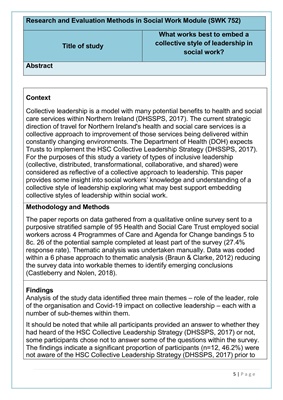
5 | P a g e
Research and Evaluation Methods in Social Work Module (SWK 752)
Title of study
What works best to embed a
collective style of leadership in
social work?
Abstract
Context
Collective leadership is a model with many potential benefits to health and social
care services within Northern Ireland (DHSSPS, 2017). The current strategic
direction of travel for Northern Ireland's health and social care services is a
collective approach to improvement of those services being delivered within
constantly changing environments. The Department of Health (DOH) expects
Trusts to implement the HSC Collective Leadership Strategy (DHSSPS, 2017).
For the purposes of this study a variety of types of inclusive leadership
(collective, distributed, transformational, collaborative, and shared) were
considered as reflective of a collective approach to leadership. This paper
provides some insight into social workers' knowledge and understanding of a
collective style of leadership exploring what may best support embedding
collective styles of leadership within social work.
Methodology and Methods
The paper reports on data gathered from a qualitative online survey sent to a
purposive stratified sample of 95 Health and Social Care Trust employed social
workers across 4 Programmes of Care and Agenda for Change bandings 5 to
8c. 26 of the potential sample completed at least part of the survey (27.4%
response rate). Thematic analysis was undertaken manually. Data was coded
within a 6 phase approach to thematic analysis (Braun & Clarke, 2012) reducing
the survey data into workable themes to identify emerging conclusions
(Castleberry and Nolen, 2018).
Findings
Analysis of the study data identified three main themes - role of the leader, role
of the organisation and Covid-19 impact on collective leadership - each with a
number of sub-themes within them.
It should be noted that while all participants provided an answer to whether they
had heard of the HSC Collective Leadership Strategy (DHSSPS, 2017) or not,
some participants chose not to answer some of the questions within the survey.
The findings indicate a significant proportion of participants (n=12, 46.2%) were
not aware of the HSC Collective Leadership Strategy (DHSSPS, 2017) prior to